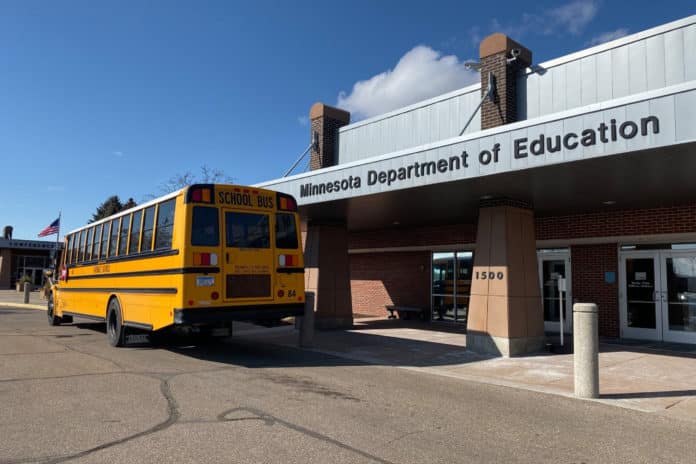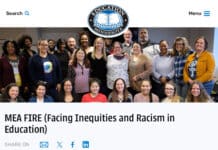(Center of the American Experiment) — Minnesota’s proposed new social studies standards have sparked controversy since the first draft was released in December 2020. What’s grabbed public attention in the final draft, now in the rule-making process, is Ethnic Studies. The Minnesota Department of Education (MDE) has added this highly politicized “fifth strand” — unauthorized by statute — to the four content areas named in law: history, government and citizenship, geography and economics.
The inclusion of Ethnic Studies marks a victory for forces seeking to radically remake Minnesota’s public schools. Ethnic Studies goes beyond the standard “anti-racist” Critical Race Theory (CRT) focus, especially in its stress on student political activism: “disrupting,” “dismantling” and “transforming” our nation’s fundamental institutions. It imports the whole ideological thought world from which CRT sprang, and serves as a vector for the activist network that is driving it nationally.
In short, Ethnic Studies is the spider at the center of the web that MDE is spinning.
How did this extremist ideology — born of the “Third World Liberation Front” that grew out of the 1968 student strikes and riots in California — make its way from San Francisco and Berkeley to elementary classrooms in Litchfield and Faribault, Minnesota?
It’s a scandalous story. When MDE appointed the standards drafting committee, it took the unprecedented step of excluding academic subject matter experts in history, civics, geography and economics. Instead, it stacked the committee with political activists, community organizers and their allies, who dominated the process.
These activists’ goal was not to revise and improve “rigorous standards” in “core academic subjects” in our state’s K-12 public schools, as law requires. On the contrary, they view Minnesota’s public education system — as drafting committee member Jonathan Hamilton, of Education for Liberation Minnesota, has described it — as a “white supremacist puzzle that must be taken apart and exposed for the lie it is (emphasis added).”
Activists’ weapon of choice in taking our schools apart is Ethnic Studies. Forget about teaching students about the historical leaders and events that shaped our democracy, like George Washington, Abraham Lincoln, and America-led victories in World War II. MDE’s new “fifth strand” trains K-12 students to view our nation’s social and political institutions with suspicion and hostility and seeks to enlist them in what Hamilton has referred to as a “political struggle” to change the social, economic, and cultural system that underlies our polity.
How will Ethnic Studies play out in Minnesota classrooms?
When the Minnesota Legislature adopted our state’s social studies standards in 2004, it authorized MDE to revise them every 10 years to “raise academic expectations for students, teachers and schools.” By law, state standards must be both “objective” and “measurable,” and “consistent with” the U.S. and Minnesota Constitutions.
But MDE’s proposed standards fail on all these fronts. Under the new Ethnic Studies standards, one of which is entitled “Resistance,” for example, students are instructed to “organize” to resist America’s “systemic and coordinated exercises of power” against “marginalized,” oppressed groups.
How will this play out in Minnesota’s classrooms? Here’s an example: Students will study our police departments and justice system in connection with an Ethnic Studies standard that requires them to “understand the roots of contemporary systems of oppression” and “eliminate” “injustices.”
To this end, fifth graders will first “examine contemporary policing” and its alleged “historical roots in early America.” The claim is that our police departments sprang directly from slave patrols of the Old South.
Sixth graders will describe the “impact” of “Minnesota’s juvenile justice system” on youth “from historically disenfranchised groups.” High school standards suggest the notion of criminality itself is racist: “explore how criminality is constructed and what makes a person a criminal.”
Biased, misleading instruction of this kind will likely convince many young people that policing and the very idea of criminality are oppressive, racially “constructed,” and among the many things schools are instructing them to “resist.”
How did Minnesota schools get hijacked in service of this extremist agenda? To answer, we must examine who drafted the standards, investigate their links to like-minded groups, and connect the dots.
The story begins in July 2020, with MDE’s decision to appoint a core group of leaders of the Minnesota Ethnic Studies Coalition (MESC) and their allies to the standards drafting committee.
MESC is an alliance of 15 advocacy groups. Its goal is to “solidif[y] Ethnic Studies” throughout K-12 education in order to “center” (i.e., shift the instructional focus to) groups “erased from mainstream curricula due to persistent racism, patriarchy, xenophobia, and linguistic imperialism.”
MESC-allied committee members are drawn from organizations like Navigate MN, “an intersectional, women/queer Latinx led organization committed to social justice,” and Education Evolving, which denounces American history as a shameful tale of “systemic, economic, political and moral inequity.” In the absence of subject matter experts — and in an atmosphere where opposing views often prompt charges of racism — MESC dominated MDE’s standards drafting process, according to educators who observed it.
The Minnesota Ethnic Studies Coalition is relatively new to our state’s educational scene. It was created in 2019 as the tactical arm of another activist organization, Education for Liberation Minnesota, according to EdLib MN’s website.
The mission of EdLib MN — which describes itself as a network of activists, teachers, academics, and youth-led organizations — is “to be a political force” in Minnesota to “contend with the status quo of colonial education that prioritizes Eurocentric curricula” and “predominantly white educators and administrators,” according to its website.
Jonathan Hamilton is both a member of MDE’s social studies standards committee and a leader of EdLib MN. He is also lead author of a 2017 essay titled, “The Need for Ethnic Studies Curricula in Minnesota.” The essay defines Ethnic Studies as “a curriculum that uses critical pedagogy to engage all students” in “dialogue to name and ultimately transform oppressive social and structural conditions within schools and the larger society.”
EdLib MN maintains that schools must view students through the lens of skin color. It claims that black students who misbehave in school are “consciously or unconsciously resist[ing] racist educational contexts,” and so must be seen, not as “behavior problems,” but as “barometers who measure the toxic atmosphere” of “a deep history of anti-black and white supremacist logics.”
EdLib MN maintains that “modern police departments” evolved “directly” from “slave patrols,” and advocates the “abolition” of police forces, prisons and border controls. Its end game is political upheaval and revolution. Recently, posting under the name of “Support the 5th strand,” EdLib MN retweeted a graphic: “The abolition of policing is about building a new world.” “Defunding the police” and “rebuilding the commons” means “abolishing the social order and building a new society.”
Connecting the dots
The campaign to highjack the revision of Minnesota’s social studies standards may look homegrown, but it is nothing of the kind. EdLib MN is a state chapter — indeed the only state chapter — of a national extremist organization called the Education for Liberation Network.
The EdLib Network makes no secret of its revolutionary agenda: to dismantle and replace America’s fundamental institutions. Or in its own words, it “promote[s] the transformation of existing institutions and the creation of new ones that reflect the values of Education for Liberation.” The network’s strategy to achieve this objective is “wholesale K-16 implementation” of Ethnic Studies in schools across the nation.
Two 20th-century Marxist thinkers, Paulo Freire and Antonio Gramsci, are central to the Ed Lib Network’s worldview. Though little known outside academic and activist circles, these men’s thought was hugely influential in producing our current cultural moment.
The name and concept of “Education for Liberation” are drawn from the ideology of Brazilian Paulo Freire, author of Pedagogy of the Oppressed, published in 1968. Freire maintained that education’s purpose is not to pass on knowledge, but to build revolutionary consciousness among the “oppressed” to achieve “liberation” by overthrowing the system. For decades, his book has been one of the most widely assigned texts in many colleges of education.
Antonio Gramsci, an Italian Communist, has been called the godfather of cultural Marxism. In the 1930s, he proposed that a robust civil society renders Western capitalist nations immune to revolution on economic grounds. To counter this, he proposed that activists infiltrate and gain control of key institutions of civil society, like schools and political parties, to shape a new ideological consensus and organize opposition to the existing social order. This strategy has become known as “the long march through the institutions.”
According to its website, the EdLib Network has worked since 2012 to promote Ethnic Studies in California, the epicenter of the movement. In March 2021, California’s board of education approved the state’s new Ethnic Studies Model Curriculum.
The model curriculum’s “guiding principles” call for “transformative resistance” and repudiate “forms of power and oppression” that include “cisheteropatriarchy” and “anthropocentrism” — the belief that human beings are superior to animals. The curriculum originally incorporated student chants to bloodthirsty Aztec gods, but recently dropped these following a legal settlement.
Now the EdLib Network is going state-by-state, “building power from the ground up” and creating “regional assemblies” to help “educators and grassroots organizers to implement Ethnic Studies in their own communities.”
Today, Minnesota is a primary front in this campaign. The network is working through MESC and EdLib MN to commandeer our K-12 social studies standards revision process, to make our state a national model of how to use academic standards to embed Ethnic Studies ideology in K-12 schools statewide.
In this campaign, Brian Lozenski, a member of the EdLib Network advisory board, has played an important role. Like Jonathan Hamilton, he is a professor at Macalester College in St. Paul.
In November 2020, Lozenski and Hamilton coauthored a MinnPost article titled “The Time for Ethnic Studies is Now,” just as MDE released the standards’ first draft. There, they highlighted our upcoming standards revision process as a unique “opportunity” to rid Minnesota of its “Eurocentric, whitewashed” curriculum.
Why is promoting student “resistance” such a central focus in Ethnic Studies? Lozenski was candid about this in an article titled “The Black Radical Tradition Can Help Us Imagine a More Just World,” which he wrote in June 2020 during the George Floyd riots. There, he describes the riots as “mass uprisings against racialized state violence,” which portend “the inevitable death” of the American “social order that prioritizes vulgar economics.” After COVID closings, Lozenski concludes, “Schools need only reopen if they join the social unrest and actively combat the greater public health crisis of systemic racism (emphasis added).”
The on-the-ground campaign in Minnesota
Minnesota is now in the grip of a national movement that is using the roadmap laid out in California to enlist our children as foot soldiers in an extremist political crusade. Events in California can provide a window into Minnesota’s future.
In July 2019, the EdLib Network and its allies kicked into high gear their campaign to co-opt Minnesota’s standards revision process. They hosted their biennial “Free Minds, Free People” (FMFP) conference in Minneapolis.
The conference drew more than 1,000 radical activists and educators, among them primary players in California’s Ethnic Studies movement. The theme of its “Radical Professional Development” sessions — featuring workshops with titles like “Smashing the Patriarchy on the Playground” — was “Confronting the Oppressor from the Inside Out” (“Teach from spaces of resistance”).
After the conference, activists made two key strategic moves. First, “core local Minnesota-based FMFP” organizers established EdLib MN, with Brian Lozenski as “founding organizer.”
Second, EdLib MN set up the Minnesota Ethnic Studies Coalition. MESC’s strategy was two-pronged: 1) to pass a bill mandating Ethnic Studies statewide, and 2) to revise the social studies standards by getting its representatives — all Ethnic Studies partisans — named to MDE’s drafting committee, according to EdLib MN’s website.
The Minnesota Legislature rejected a proposal to require the inclusion of Ethnic Studies in state standards in 2021. But EdLib MN’s second tactic was successful: MDE bypassed academic subject matter experts and stacked the social studies committee with key leaders from MESC’s member groups and allies.
From the beginning, Ethnic Studies activists here have used a step-by-step approach. They began by successfully pressuring the Minneapolis and St. Paul Public Schools to adopt Ethnic Studies, first as a high school elective and then as a graduation requirement.
In their current campaign to co-opt the social studies standards, they have simultaneously dominated the drafting process, and mobilized cadres in classic “community organizing” style to pressure MDE and the Office of Administrative Hearings to approve the standards they write.
Jonathan Hamilton of EdLib MN laid out 17 “action steps” for this battleplan in his essay “The Need for Ethnic Studies Curricula in Minnesota Schools.” First and foremost, he advised activists to “learn from the efforts of the Ethnic Studies Now movement in California.”
Some of Hamilton’s recommended action steps, like “’signing petitions” and “holding rallies,” are designed to gain attention and give the impression of widespread support. (This may shed light on the rallies, and the petitions claiming thousands of signatures, that cropped up — seemingly spontaneously — in some metro-area school districts in the spring and summer of 2020.)
Other action steps are policy-focused, i.e., “demanding” resources for hiring “teachers with knowledge of Ethnic Studies.” Still others call for strategic partnerships, ie, “engaging the support of teacher unions.” (The Minneapolis teachers union is an MESC member.)
Hamilton placed central importance on “starting student/youth organizations to call for change.” Ethnic Studies activists work diligently to convince the public and school officials that “calls for change” are student-driven.
Groups like “Youth 4 Ethnic Studies” play a central role in another Hamilton action step — “demanding the support of school/district administration and school boards.” That’s because school officials generally find strident, grievance-centered “student demands” hard to turn down. Meanwhile, MESC groups like Navigate MN and the Asian American Organizing Partnership (AAOP) are organizing summer activities and internships for young people, where they indoctrinate them in Ethnic Studies ideology and coach them in community organizing techniques.
Make no mistake: “Student-led,” “grassroots” groups are generally a front for the strategically sophisticated, well-funded community organizers who are driving the Ethnic Studies crusade. When these activists seek to influence the public or elected officials, they lead with “feel-good” claims, i.e., that Ethnic Studies helps students “see themselves in the curriculum” or that it boosts academic performance. They also place a high priority on personal anecdotes designed to evoke empathy.
But when they address fellow ideologues, they are forthright about their true goals. In a virtual kick-off for Ed Lib MN’s “BIPOC Ethnic Studies Learning Cohort,” Rose Brewer of the University of Minnesota’s African American and African Studies Department affirms Ethnic Studies’ “deep call” for “seizing knowledge channels to further our liberation.”
The upheaval to come
Before MDE can formally adopt its proposed social studies standards, a hearing will take place before an administrative law judge. The judge will evaluate whether the agency followed proper rule-making procedures and whether the standards are consistent with statute. On this basis, the judge will write a report recommending whether the standards should go forward or be revised. The full statutory rule-making process can take up to 24 months.
If MDE adopts the standards in their current form, we can expect upheaval in our schools. The costs and burdens the impending transformation will impose are unknown. Many teachers who have reviewed MDE’s final draft regard it as an “unteachable hodge-podge,” according to educators familiar with behind-the-scenes responses. Ethnic Studies is not only a new “fifth strand,” with standards of its own, but is woven throughout history, geography, civics and economics in what some teachers call a “double whammy.”
This means districts may be compelled to completely rewrite their social studies lesson plans and provide costly Ethnic Studies “training” for teachers from “consultants” eager to push their services.
MDE claims school districts have local control over implementation of new social studies standards. But where will teachers find curricula that link police to slave patrols or exhort students to “organize,” “resist,” and “eliminate” oppression? EdLib MN and other advocacy groups are primed to step into this vacuum. EdLib MN, for example, has already created a curriculum that is “aligned to Minnesota state standards” and designed to convince young people that police should be abolished.
California Ethnic Studies activists are also waiting in the wings. The state’s new model curriculum is hundreds of pages long. In addition, the Liberated Ethnic Studies Model Curriculum Coalition (LESMC) is lobbying districts there to adopt its alternative pre-K-12 curriculum, which it will offer for free.
Why should Minnesotans care about this? Because MESC, the EdLib Network and LESMC are all members of a national coalition “fighting for liberated Ethnic Studies curricula and CRT,” and MESC will likely eagerly promote the new “liberated” curriculum in Minnesota.
The curriculum begins by declaring its support for political revolution: “System changes occur when people unite, mobilize and organize in coordinated resistance to disrupt and dismantle inequitable systems (emphasis added).”
Lessons are saturated with the concepts and lingo of Antonio Gramsci’s Marxist ideology. Starting in pre-K, for example, students are taught to reject “normalization.” Older students are repeatedly instructed to question “common sense,” and refuse to “consent” to “hegemony”— i.e., the power “white men” use to dominate others. In grades 7-12 lessons, Gramsci is invoked by name. “We need to understand common sense the way that Antonio Gramsci, an Italian philosopher, understood it,” students are told. They are asked, “What hegemonic beliefs do you plan to disrupt?” and assigned to “create counter-hegemonic stories.”
Throughout, instruction is cult-like and highly manipulative, and the pressure to conform is overwhelming. Elementary pupils are assigned to rewrite popular songs to reflect Ethnic Studies ideology, and to recite Gramsci’s ideological tenets in “choral readings.” Overall, these mind-numbing lessons conjure images of youthful Red Guards being groomed for China’s Cultural Revolution.
For Gov. Tim Walz and his administration, stacking the social studies standards committee with political activists was just the beginning of a frontal Ethnic Studies assault. As the 2022 legislative session opened, Walz proposed legislation that would mandate Ethnic Studies — defined in the “liberated” sense — across all academic subject areas, including math and science, from grades K through 12. It would even mandate Ethnic Studies in private and home schools.
The new field of “Ethnomathematics” teaches that math began in ancient “empires of color,” was appropriated by the West to oppress BIPOC (Black, Indigenous and People of Color), and should be taught, in part, through racial and ethnic storytelling. In science class, MESC suggests, students may study “Ojibwe architecture.”
In addition to Walz’s policy bill, legislative proposals from 2021 are being resurrected in a variety of ways, including one bill that would require MDE to establish an Ethnic Studies Task Force, with “input” from (who else?) the Minnesota Ethnic Studies Coalition. This task force would be charged with developing K-12 Ethnic Studies standards in a range of subject areas, which MDE would be required by law to adopt and to do so using an expedited process allowing minimal public input. The task force would also recommend Ethnic Studies resources for K-12 schools, and advise on and review MDE’s model Ethnic Studies curriculum.
Minnesota Ethnic Studies activists are already moving on several fronts to take control of curricular content across all disciplines, thus rendering local control essentially meaningless. They are seeking to regulate who can teach Ethnic Studies by requiring a license in the subject (as a science teacher must be licensed), in order to ensure that all Ethnic Studies instruction reflects radical themes. They are also making plans to require Ethnic Studies in the “transfer curriculum” that students in two-year community colleges must take to transfer to public colleges and universities.
Ethnic Studies radicals have burrowed deep into our state’s education establishment. For example, Jonathan Hamilton, who represents EdLib MN on MDE’s standards committee, was until recently the research director at the non-profit Minnesota Education Equity Partnership (MNEEP). MNEEP’s executive director is Rep. Carlos Mariani, a longtime DFL legislative leader who has served as chair of the House Education Policy Committee. The non-profit’s funders include a “who’s who” of Minnesota foundations, among them 3M, Blandin, Bush, Bremer, McKnight, Securian, Mortenson, the Minneapolis Foundation, and the Greater Twin Cities United Way.
The new social studies standards may well bring financial benefits to groups like Mariani’s, which offers a range of “racial equity” services and training to school districts. Not surprisingly, the people who write or lobby for “equity”-related laws or standards and the consultants who advise on their implementation are not infrequently the same. In California, for example, Ethnic Studies activists who were originally involved in the state’s model curriculum are building educational consulting businesses, one of which has charged $1,500 an hour.
Walz and his Department of Education are on the cusp of making immersion in Ethnic Studies a reality in Minnesota’s K-12 schools. On their watch, extremists are poised to reshape our children’s identity and worldviews, and to use our tax dollars to do it. Meanwhile, many young people — especially minority children — lack the basics in history, reading, science and math, as class time spent on fundamental knowledge shifts to indoctrination in extremist ideology.
Brave parents are stepping up to demand that our schools be returned to the people of Minnesota. But so far others — including the business community, civic organizations, and school boards and administrators — have been silent. Unless we all raise our voices, our state’s, and our children’s, futures will soon be in the hands of forces determined to transform our nation beyond recognition.
Standards in review
Minnesota has statewide K-12 academic standards in the core subject areas of language arts, math, social studies, arts and science. The standards lay out what students must “satisfactorily complete” to graduate from high school, and are reviewed and revised every 10 years. The revised standards are adopted through the rule-making process.
The current social studies standards review process began in September 2020. MDE appointed a committee to review and revise the standards, and the committee released three successive drafts, taking public comments after each.
In November 2021, following the third and final draft’s release, the statutory rule-making process began. This process can take up to 24 months.
Katherine Kersten
Katherine Kersten, a writer and attorney, is a Senior Policy Fellow at Center of the American Experiment. She served as a Metro columnist for the Star Tribune (Minneapolis) from 2005 to 2008 and as an opinion columnist for the paper for 15 years between 1996 and 2013. She was a founding director of the Center and served as its chair from 1996 to 1998.











